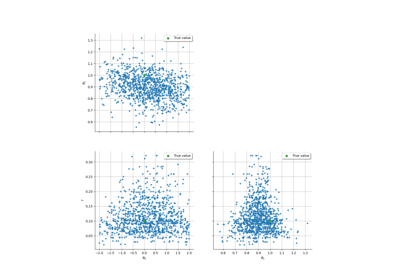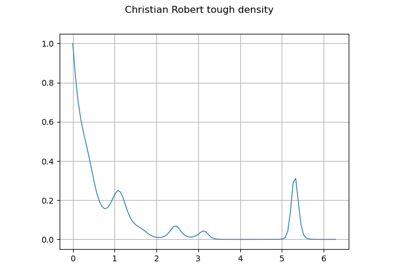MetropolisHastings¶
- class MetropolisHastings(*args)¶
Base class for Metropolis-Hastings algorithms.
Refer to Bayesian calibration, The Metropolis-Hastings Algorithm.
Methods
computeLogLikelihood(state)Compute the logarithm of the likelihood w.r.t.
computeLogPosterior(currentState)Compute the logarithm of the unnormalized posterior density.
Get acceptance rate.
Accessor to the object's name.
Get the conditional distribution.
Get the parameters.
Accessor to the dimension of the RandomVector.
Get the history storage.
getId()Accessor to the object's id.
Accessor to the underlying implementation.
Get the initial state.
Get the model.
Get the indices of the sampled components.
getName()Accessor to the object's name.
Get the observations.
Compute one realization of the RandomVector.
Get the target distribution.
Get the target log-pdf.
Get the target log-pdf support.
setHistory(strategy)Set the history storage.
setLikelihood(*args)Set the likelihood.
setName(name)Accessor to the object's name.
See also
Notes
Metropolis-Hastings algorithms are Markov Chain Monte-Carlo algorithms: they can sample from a target distribution defined as having a PDF proportional to some known function.
If
setLikelihood()is used, then a likelihood factor is applied to the PDF of the target distribution: in Bayesian terms, the initially targeted distribution is the prior, and multiplying its PDF by the likelihood yields the PDF of the posterior up to a multiplicative constant.- __init__(*args)¶
- computeLogLikelihood(state)¶
Compute the logarithm of the likelihood w.r.t. observations.
- Parameters:
- currentStatesequence of float
Current state.
- Returns:
- logLikelihoodfloat
Logarithm of the likelihood w.r.t. observations
.
- computeLogPosterior(currentState)¶
Compute the logarithm of the unnormalized posterior density.
- Parameters:
- currentStatesequence of float
Current state.
- Returns:
- logPosteriorfloat
Target log-PDF plus log-likelihood if the log-likelihood is defined
- getAcceptanceRate()¶
Get acceptance rate.
- Returns:
- acceptanceRatefloat
Global acceptance rates over all the MCMC iterations performed.
- getClassName()¶
Accessor to the object’s name.
- Returns:
- class_namestr
The object class name (object.__class__.__name__).
- getConditional()¶
Get the conditional distribution.
- Returns:
- conditional
Distribution The conditional argument provided to
setLikelihood()
- conditional
- getCovariates()¶
Get the parameters.
- Returns:
- parameters
Point Fixed parameters of the model
required to define the likelihood.
- parameters
- getDimension()¶
Accessor to the dimension of the RandomVector.
- Returns:
- dimensionpositive int
Dimension of the RandomVector.
- getHistory()¶
Get the history storage.
- Returns:
- history
HistoryStrategy Used to record the chain.
- history
- getId()¶
Accessor to the object’s id.
- Returns:
- idint
Internal unique identifier.
- getImplementation()¶
Accessor to the underlying implementation.
- Returns:
- implImplementation
A copy of the underlying implementation object.
- getInitialState()¶
Get the initial state.
- Returns:
- initialStatesequence of float
Initial state of the chain
- getLinkFunction()¶
Get the model.
- Returns:
- linkFunction
Function The linkFunction argument provided to
setLikelihood()
- linkFunction
- getMarginalIndices()¶
Get the indices of the sampled components.
- Returns:
- marginalIndices
Indices The marginalIndices argument provided to the constructor
- marginalIndices
- getName()¶
Accessor to the object’s name.
- Returns:
- namestr
The name of the object.
- getObservations()¶
Get the observations.
- Returns:
- observations
Sample The observations argument provided to
setLikelihood()
- observations
- getRealization()¶
Compute one realization of the RandomVector.
- Returns:
- realization
Point Sequence of values randomly determined from the RandomVector definition. In the case of an event: one realization of the event (considered as a Bernoulli variable) which is a boolean value (1 for the realization of the event and 0 else).
- realization
See also
Examples
>>> import openturns as ot >>> distribution = ot.Normal([0.0, 0.0], [1.0, 1.0], ot.CorrelationMatrix(2)) >>> randomVector = ot.RandomVector(distribution) >>> ot.RandomGenerator.SetSeed(0) >>> print(randomVector.getRealization()) [0.608202,-1.26617] >>> print(randomVector.getRealization()) [-0.438266,1.20548]
- getTargetDistribution()¶
Get the target distribution.
- Returns:
- targetDistribution
Distribution The targetDistribution argument provided to the constructor
- targetDistribution
- getTargetLogPDF()¶
Get the target log-pdf.
- Returns:
- targetLogPDF
Function The targetLogPDF argument provided to the constructor
- targetLogPDF
- getTargetLogPDFSupport()¶
Get the target log-pdf support.
- Returns:
- support
Interval The support argument provided to the constructor
- support
- setHistory(strategy)¶
Set the history storage.
- Parameters:
- history
HistoryStrategy Used to record the chain.
- history
- setLikelihood(*args)¶
Set the likelihood.
- Parameters:
- conditional
Distribution Required distribution to define the likelihood of the underlying Bayesian statistical model.
- observations2-d sequence of float
Observations
required to define the likelihood.
- linkFunction
Function, optional Function
that maps the chain into the conditional distribution parameters. If provided, its input dimension must match the chain dimension and its output dimension must match the conditional distribution parameter dimension. Else it is set to the identity.
- covariates2-d sequence of float, optional
Parameters
of the linkFunction for each observation
. If provided, their dimension must match the parameter dimension of linkFunction.
- conditional
Notes
Once this method is called, the class no longer samples from the distribution targetDistribution or from the distribution defined by targetLogPDF and support, but considers that distribution as being the prior. Let
be the PDF of the prior at the point
. The class now samples from the posterior, whose PDF is proportional to
, the likelihood
being defined from the arguments of this method.
The optional parameters linkFunction and covariates allow several options to define the likelihood
. Letting
be the PDF of the distribution conditional:
Without linkFunction and covariates the likelihood term reads:
If only the linkFunction is provided:
If both the linkFunction and covariates are provided:
- setName(name)¶
Accessor to the object’s name.
- Parameters:
- namestr
The name of the object.
Examples using the class¶

Linear Regression with interval-censored observations
 OpenTURNS
OpenTURNS
